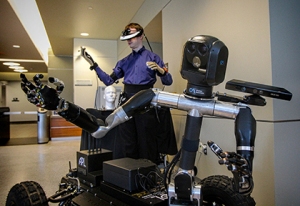Aug 23 2013
The Johns Hopkins University Applied Physics Laboratory (APL) in Laurel, Md., and the Howard County Economic Development Authority (HCEDA) have established a technology transfer partnership to bring APL innovation to the marketplace. Howard County Executive Ken Ulman joined APL Director Ralph Semmel and HCEDA Chief Executive Officer Larry Twele as they signed the agreement and announced details of the partnership on Aug. 22.
 APL inventor Matt Para teleoperates RoboSally, a robotic system developed by a team at APL. RoboSally leverages two Modular Prosthetic Limbs, designed to replicate human capabilities to safely remove humans from life-threatening operations. Image Credit: Scott Kramer
APL inventor Matt Para teleoperates RoboSally, a robotic system developed by a team at APL. RoboSally leverages two Modular Prosthetic Limbs, designed to replicate human capabilities to safely remove humans from life-threatening operations. Image Credit: Scott Kramer
The partners seek to create new companies and accelerate commercialization of targeted technologies, many developed at APL for government use. Together, APL and HCEDA will identify inventions they believe have the best chance of commercial success. “Teaming APL with HCEDA and its Maryland Center for Entrepreneurship (MCE) creates a powerful coalition with a keen ability to form companies and transition innovative technologies to the community and broader marketplace,” Semmel says.
“The partnership builds on the long relationship between the county and APL, and provides the foundation to move Maryland into the future,” Ulman says. “The work being done at APL is fantastic, and we will now be able to provide the resources that help some groundbreaking developments turn into new businesses and jobs.”
MCE will help the resulting companies connect with the growing regional entrepreneurial ecosystem. It will team up with inventors to create the companies and provide them with mentorship, networking opportunities, educational programs and other services and support. “We are excited about this new initiative,” says Twele. “The Maryland Center for Entrepreneurship was created for just this type of project. We are in the environment where great ideas grow into great businesses. We can’t wait to begin working with the scientists, researchers and engineers at APL.”
“This is a wonderful opportunity for APL’s many talented inventors,” says Semmel. “In particular, MCE and the inventor can work together to bring the new company through the tough initial phases of starting a business.”
While this is a broad technology transfer partnership for APL, the Lab has an impressive record of moving ideas and innovations to the local and regional marketplace. APL’s Office of Technology Transfer helped its inventors disclose almost 240 inventions each year in 2011 and 2012. ”We expect to significantly increase the number of start-up companies based on APL inventions this year too,” says Norma Lee Todd of APL’s Office of Technology Transfer.
The signing event at APL also featured demonstrations of several technologies with commercial potential, such as a backpack-sized package for creating maps in GPS-deprived areas, a device that turns off-the-shelf, remote-controlled vehicles into autonomously controlled vehicles, and materials developed to help repair eye injuries. The full list of inventions displayed and their commercial applications is provided in an Innovative Technologies Flyer.